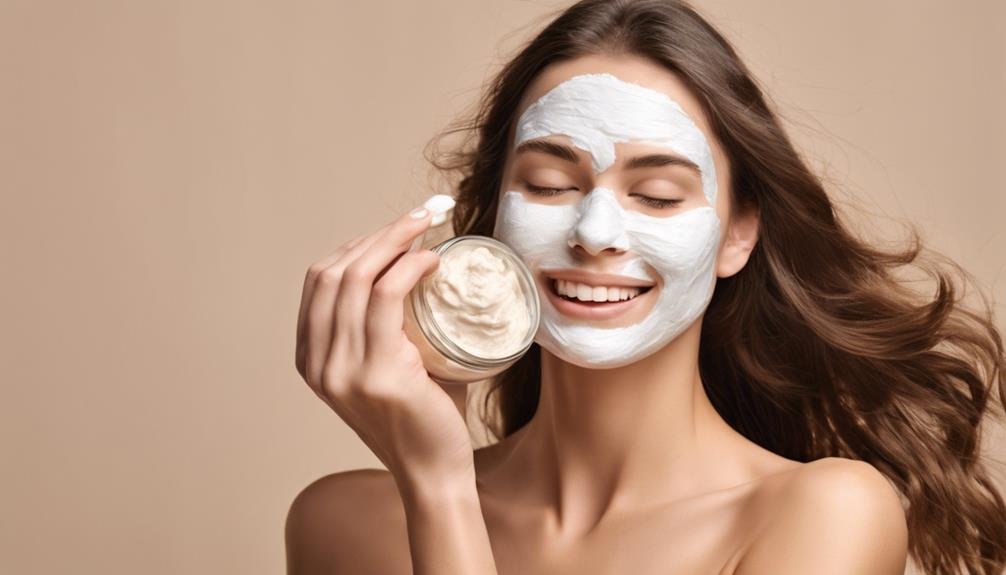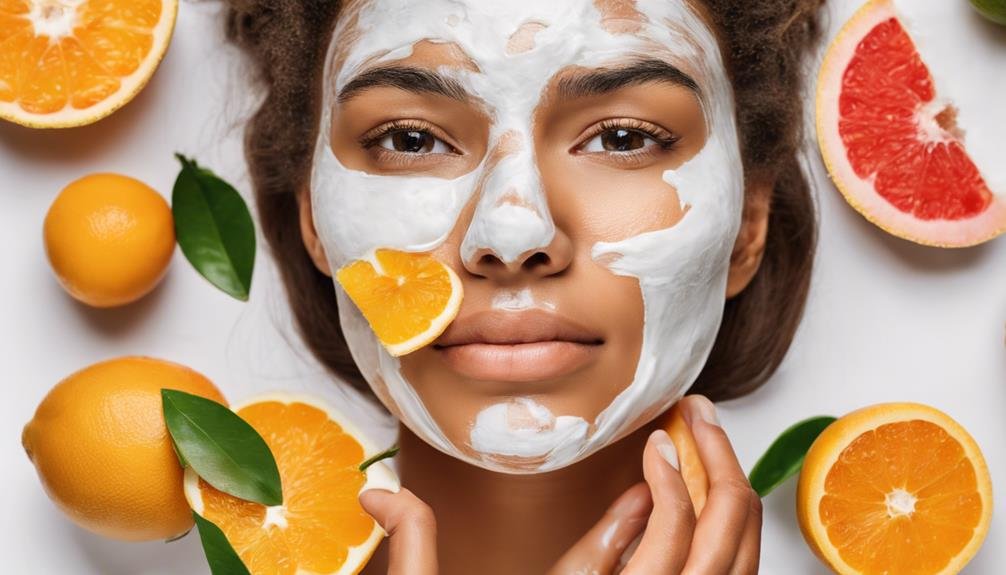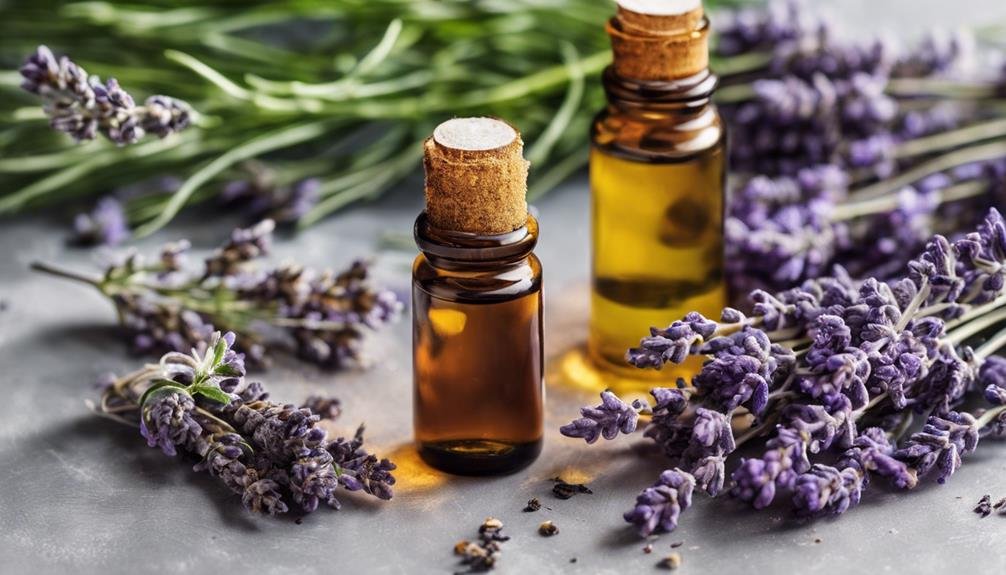If you're looking to address hyperpigmentation naturally, there are various strategies you can explore to help restore your skin's balance and radiance. From incorporating specific ingredients and techniques to adopting a holistic approach that encompasses skincare, diet, and stress management, the possibilities are abundant. By taking proactive steps and making informed choices, you can embark on a journey towards achieving a more even skin tone and renewed confidence in your complexion.
Key Takeaways
- Use turmeric to brighten skin and reduce dark spots naturally.
- Incorporate licorice root extract to inhibit melanin production.
- Aloe vera soothes skin and aids in healing hyperpigmentation.
- Green tea extract helps even out skin tone and reduce discoloration.
- Perform a patch test before using herbal remedies for hyperpigmentation.
Understanding Hyperpigmentation
Understanding hyperpigmentation is essential for effectively addressing this common skin concern. Hyperpigmentation occurs when there's an overproduction of melanin, the pigment responsible for skin color. This leads to dark patches or spots on the skin, often caused by sun exposure, hormonal changes, inflammation, or skin injuries. By understanding the triggers of hyperpigmentation, you can better manage and treat this condition.
There are different types of hyperpigmentation, including melasma, post-inflammatory hyperpigmentation, and sunspots. Melasma is often triggered by hormonal changes, particularly during pregnancy or when using hormonal contraceptives. Post-inflammatory hyperpigmentation occurs after skin inflammation or injury, such as acne or eczema. Sunspots, also known as solar lentigines, are caused by prolonged sun exposure.
To effectively address hyperpigmentation, it's crucial to use treatments that target melanin production, such as topical creams containing ingredients like hydroquinone, kojic acid, or retinoids. Additionally, incorporating sun protection into your daily skincare routine is vital to prevent further darkening of existing spots. By understanding the root causes of hyperpigmentation and choosing appropriate treatments, you can effectively manage this common skin concern.
Importance of Sun Protection
To effectively protect your skin from the damaging effects of the sun, it's crucial to understand the importance of sun protection. Sun exposure is one of the leading causes of hyperpigmentation, as UV rays can trigger melanin production, leading to dark spots and uneven skin tone.
By consistently using sunscreen with a high SPF, you create a barrier that shields your skin from harmful UV rays. This protection not only prevents further hyperpigmentation but also allows existing dark spots to fade more effectively.
In addition to sunscreen, wearing protective clothing like hats and sunglasses can further safeguard your skin. Seeking shade during peak sun hours and avoiding prolonged sun exposure can also help in preventing hyperpigmentation.
Remember that even on cloudy days, UV rays can still penetrate through, so sun protection should be a daily habit.
Gentle Exfoliation Techniques
For optimal skin health and to address hyperpigmentation effectively, incorporating gentle exfoliation techniques into your skincare routine is essential. Exfoliation helps to remove dead skin cells that can contribute to an uneven skin tone and hyperpigmentation.
When choosing an exfoliation method, opt for gentle options like chemical exfoliants with ingredients such as alpha hydroxy acids (AHAs) or beta hydroxy acids (BHAs). These ingredients work to dissolve the bonds between dead skin cells, revealing brighter and more even-toned skin.
Physical exfoliants like scrubs with small, rounded particles can also be effective, but be cautious as they can sometimes be too harsh on the skin, especially if you have hyperpigmentation. Over-exfoliation can irritate the skin and worsen hyperpigmentation, so it's important to exfoliate gently and not more than 2-3 times a week.
After exfoliation, follow up with a hydrating and soothing moisturizer to keep your skin barrier healthy and promote skin regeneration.
Brightening Face Masks
One effective way to address hyperpigmentation and promote a brighter complexion is by incorporating brightening face masks into your skincare routine. These masks are formulated with ingredients that target uneven skin tone, dark spots, and discoloration, helping to reveal a more radiant and even skin tone. Below is a table showcasing some key ingredients to look for in brightening face masks:
| Key Ingredient | Benefits |
|---|---|
| Vitamin C | Fades dark spots and evens out skin tone |
| Niacinamide | Reduces inflammation and hyperpigmentation |
| Licorice Extract | Brightens skin and reduces discoloration |
| Alpha Arbutin | Lightens dark spots and evens skin tone |
Incorporating brightening face masks into your routine can help in your journey towards achieving a more even and radiant complexion. Remember to patch test new products and consult with a dermatologist if you have sensitive skin or specific concerns.
Incorporating Vitamin C
Vitamin C is a potent ingredient known for its ability to brighten and even out the skin tone. When it comes to hyperpigmentation, incorporating Vitamin C into your skincare routine can be a game-changer. This powerhouse antioxidant helps to inhibit melanin production, which is responsible for dark spots and uneven skin tone.
Vitamin C also aids in collagen production, promoting skin healing and reducing the appearance of pigmentation.
To incorporate Vitamin C into your routine, look for serums or creams containing stable forms of Vitamin C, such as ascorbic acid or sodium ascorbyl phosphate. These formulations ensure maximum effectiveness.
Start by applying a few drops of Vitamin C serum after cleansing and toning your skin, both in the morning and evening. Follow up with a moisturizer and sunscreen during the day to protect your skin from UV-induced pigmentation.
Consistency is key when using Vitamin C for hyperpigmentation. Over time, you may notice a brighter, more even complexion as Vitamin C works its magic on your skin.
Power of Antioxidants
Harnessing the power of antioxidants is crucial in combating hyperpigmentation and promoting overall skin health. Antioxidants are essential in protecting your skin from free radicals, which can worsen hyperpigmentation by triggering melanin production. By neutralizing these free radicals, antioxidants help prevent further darkening of the skin and support cellular repair processes.
Antioxidants such as vitamin E, green tea extract, and resveratrol are known for their skin-brightening properties and ability to inhibit melanin production. Including these antioxidants in your skincare routine can help fade existing dark spots and prevent new ones from forming.
In addition to their anti-hyperpigmentation benefits, antioxidants also promote overall skin health by reducing inflammation, improving skin texture, and enhancing the skin's natural defense mechanisms. They work synergistically with other skincare ingredients to boost the effectiveness of your hyperpigmentation treatment.
To maximize the benefits of antioxidants, incorporate products rich in these powerful compounds into your daily skincare regimen. Look for serums, creams, and oils containing antioxidants to help combat hyperpigmentation and achieve a brighter, more even complexion.
Hydrating Skincare Products
To effectively combat hyperpigmentation and maintain healthy skin, incorporating hydrating skincare products into your routine is essential. Hydration plays a crucial role in maintaining skin health and promoting an even skin tone.
Here are three hydrating skincare products that can help you on your journey to healthier, more radiant skin:
- Hyaluronic Acid Serum: Hyaluronic acid is a powerful humectant that attracts moisture to the skin, helping to plump up and hydrate the skin. Incorporating a hyaluronic acid serum into your skincare routine can help improve skin texture and reduce the appearance of hyperpigmentation.
- Moisturizing Cream: A rich moisturizing cream can provide long-lasting hydration and help strengthen the skin's natural moisture barrier. Look for products with ingredients like ceramides, glycerin, or shea butter to lock in moisture and keep your skin hydrated throughout the day.
- Facial Oil: Facial oils are great for sealing in moisture and nourishing the skin. Opt for oils like jojoba, rosehip, or argan oil, which are lightweight and non-comedogenic, making them suitable for most skin types.
Herbal Remedies for Skin
When looking for natural ways to address skin concerns like hyperpigmentation, exploring herbal remedies can offer a gentle yet effective approach. Several herbs have been traditionally used to help improve skin tone and reduce hyperpigmentation.
Turmeric, known for its anti-inflammatory and antioxidant properties, can help brighten skin and reduce dark spots when applied topically.
Licorice root extract contains compounds that can inhibit melanin production, making it a popular ingredient in natural skincare products aimed at reducing hyperpigmentation.
Aloe vera is another herb that can soothe the skin and promote healing, which may help fade pigmentation over time.
Green tea extract, rich in antioxidants, can also aid in evening out skin tone and reducing the appearance of dark spots.
When considering herbal remedies for hyperpigmentation, it's essential to do a patch test first to ensure you don't have any adverse reactions. While herbal remedies can be beneficial, results may vary, and consistency is key when incorporating them into your skincare routine. Remember that natural remedies work best when used in conjunction with a healthy skincare regimen.
Balancing Your Diet
To achieve healthy, glowing skin and address issues like hyperpigmentation, it's crucial to consider the role of your diet. Eating a balanced and nutritious diet can significantly impact your skin's health and help reduce hyperpigmentation. Here are three dietary tips to support your skin:
- Increase Antioxidant-Rich Foods: Incorporate fruits and vegetables like berries, spinach, and kale into your meals. These foods are packed with antioxidants that can help protect your skin from damage and promote a more even skin tone.
- Hydrate with Water: Staying hydrated is essential for healthy skin. Drinking an adequate amount of water daily can help flush out toxins, keep your skin cells hydrated, and improve overall skin appearance.
- Omega-3 Fatty Acids: Include sources of omega-3 fatty acids in your diet such as fatty fish, chia seeds, and walnuts. These healthy fats can help reduce inflammation, support skin health, and potentially improve hyperpigmentation.
Stress Management Techniques
Managing stress is crucial for maintaining overall well-being and promoting healthy skin. Stress can exacerbate hyperpigmentation, making it essential to incorporate stress management techniques into your daily routine. Here are some effective methods to help you reduce stress and improve your skin health:
| Stress Management Techniques | Benefits |
|---|---|
| Deep Breathing Exercises | Calms the mind and reduces cortisol levels. |
| Meditation | Promotes relaxation and reduces anxiety. |
| Regular Exercise | Releases endorphins, improving mood and reducing stress. |
| Adequate Sleep | Allows the body to rest and rejuvenate, reducing stress levels. |
Incorporating these stress management techniques into your daily life can help you better manage stress, which in turn can positively impact your skin health. Remember, taking care of your mental well-being is just as important as taking care of your skin.
Skin-Friendly Essential Oils
Effectively incorporating skin-friendly essential oils into your skincare routine can provide numerous benefits for addressing hyperpigmentation and promoting overall skin health. Skin-friendly essential oils are natural extracts that can help even out skin tone, reduce dark spots, and enhance the radiance of your complexion.
Here are three essential oils known for their skin-loving properties:
- Lavender Oil: Renowned for its calming scent, lavender oil also boasts skin-soothing properties. It can help reduce redness, inflammation, and discoloration caused by hyperpigmentation.
- Frankincense Oil: This oil is prized for its ability to promote cell regeneration and improve skin tone. Frankincense oil can help fade dark spots and even out skin pigmentation.
- Rosehip Oil: Rich in vitamins and antioxidants, rosehip oil is excellent for brightening the skin and reducing hyperpigmentation. It can also aid in skin repair and rejuvenation, leaving your skin looking radiant and healthy.
Consistent Skincare Routine
When creating a consistent skincare routine to address hyperpigmentation, it's crucial to focus on utilizing products and practices that support skin health and target dark spots effectively. Start your routine with a gentle cleanser to remove impurities without stripping your skin of its natural oils.
Follow up with a vitamin C serum, known for its brightening properties and ability to fade dark spots over time.
Incorporate a moisturizer with ingredients like niacinamide or licorice extract, which can help even out skin tone.
Don't forget sunscreen during the day to prevent further pigmentation.
Consider adding a retinol treatment at night to promote cell turnover and diminish the appearance of hyperpigmentation.
Consistency is key when it comes to seeing results, so stick to your routine religiously. Remember, patience is essential as improvements may take time, but with dedication, you can achieve a more even complexion.
Frequently Asked Questions
Can Hyperpigmentation Be Genetic and Passed Down Through Generations?
Yes, hyperpigmentation can be genetic and passed down through generations. Factors such as genetics, sun exposure, and hormonal changes can contribute to its development. Consulting a dermatologist can help determine the best treatment options for you.
Is It Safe to Use Natural Remedies if I Have Sensitive Skin?
If you have sensitive skin, it's essential to be cautious when using natural remedies for hyperpigmentation. Always patch test first and opt for gentle ingredients like aloe vera or green tea. Consult a dermatologist for personalized advice.
How Long Does It Typically Take to See Results From Natural Treatments?
Typically, results from natural treatments for hyperpigmentation can be seen within a few weeks to a few months. Consistency is key for best outcomes. Be patient, as each person's skin responds differently to treatments.
Are There Specific Foods or Supplements That Can Worsen Hyperpigmentation?
Avoid foods high in sugar, processed oils, and dairy, as they may exacerbate hyperpigmentation. Opt for a balanced diet rich in antioxidants, vitamins, and minerals to support skin health and potentially improve skin discoloration naturally.
Can Hormonal Changes During Pregnancy Affect Hyperpigmentation?
During pregnancy, hormonal shifts can trigger hyperpigmentation changes. This is known as melasma or "mask of pregnancy." Consult a dermatologist for personalized advice on managing skin concerns during this special time.
Conclusion
In conclusion, by incorporating natural remedies and techniques into your skincare routine, you can effectively combat hyperpigmentation and achieve a more even skin tone. Remember to stay consistent with your regimen and prioritize sun protection to prevent further damage. With a balanced diet, stress management, and the use of skin-friendly essential oils, you can support healthy skin regeneration and reduce discoloration. Stay committed to your skincare journey and watch as your skin transforms over time.







